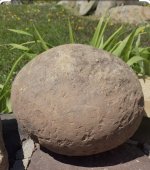BosnMate
Gold Member
- Sep 10, 2010
- 6,916
- 8,441
- Detector(s) used
- Whites MXT, Whites DFX, Whites 6000 Di Pro
- Primary Interest:
- Other
Just wondering what experience you guys have had with museums. I've donated a couple of items to museums, and later gone back, and the items aren't there, and nobody has any idea what happened to them. In my youth I worked on a ranch in Nevada, and found a number of Indian relics. Donated them to a local museum, and they are all gone except for the grinding stone I donated, and that is credited to the university. Another time I found the location of a blacksmith shop, found hand made ox shoes, hand made chain and some other stuff. Donated that to the museum. They are long gone and nobody knows anything about them. My mother loaned a museum in California a hair wreath that was done with hair from all our family members, including my grandfather, back in Victorian times, when such stuff was popular. The family wasn't 49er's, but they are among the oldest families in the area, dating way back. The wreath is not on display, and the museum says they own it, and won't return it. Mom is gone, and there is no receipt that I could find, so now I guess they do own it. When I donated stuff, they were tickled to get it, and took my information, for what ever that was worth.
Amazon Forum Fav 👍
Upvote
0









